Parametre
Viac o knihe
Max Horkheimer (1895-1973), one of the founders of critical theory has become a subject of renewed attention and appreciation in Germany in the last decade, especially since the publication of the German edition of his Collected Works in 1985. This collection of essays by German and American scholars will help familiarize English-speaking readers with the most important results of this recent work and, in conjunction with a companion volume of Horkheimer's essays, Between Philosophy and Social Science, should provide a much fuller and deeper picture of his role in the history of modern social theory. Contents: Max Horkheimer's Intellectual Physiognomy, Alfred Schmidt. Remarks on the Development of Horkheimer's Work, Jurgen Habermas. Dialectical Positivism of Happiness: Horkheimer's Materialist Deconstruction of Philosophy, Hauke Brunkhorst. The Program of Interdisciplinary Research and the Beginnings of Critical Theory, Wolfgang Bonss. The Idea of a Critical Theory and Its Relation to Philosophy, Thomas McCarthy. Stranded at the Crossroads of Dehumanization: John Desmond Bernal and Max Horkheimer, Wolf Schafer. Max Horkheimer and the Sociological Deficit of Critical Theory, Axel Honneth Critical Theory and Political Economy, Moishe Postone and Barbara Brick. The Long Friendship: On Theoretical Differences between Adorno and Horkheimer, Stefan Breuer. Max Horkheimer and the Moral Philosophy of German Idealism, Herbert Schnadelbach. "Mystical Aura": Imagination and the Reality of the "Maternal" in Horkheimer's Writings, Mechthild Rumpf. Reason and "The Other": Horkheimer's Reflections on Anti-Semitism and Mass Annihilation, Dan Diner. Mass Culture and Aesthetic Redemption: The Debate between Max Horkheimer and Siegfried Kracauer, Martin Jay. The Failure of Self-Realization: An Interpretation of Horkheimer's Eclipse of Reason, Georg Lohmarm.
Nákup knihy
On Max Horkheimer, Seyla Benhabib
- Jazyk
- Rok vydania
- 1993
Doručenie
Platobné metódy
Navrhnúť zmenu
- Titul
- On Max Horkheimer
- Jazyk
- anglicky
- Autori
- Seyla Benhabib
- Vydavateľ
- MIT Press
- Rok vydania
- 1993
- ISBN10
- 0262023555
- ISBN13
- 9780262023559
- Kategórie
- Filozofia
- Anotácia
- Max Horkheimer (1895-1973), one of the founders of critical theory has become a subject of renewed attention and appreciation in Germany in the last decade, especially since the publication of the German edition of his Collected Works in 1985. This collection of essays by German and American scholars will help familiarize English-speaking readers with the most important results of this recent work and, in conjunction with a companion volume of Horkheimer's essays, Between Philosophy and Social Science, should provide a much fuller and deeper picture of his role in the history of modern social theory. Contents: Max Horkheimer's Intellectual Physiognomy, Alfred Schmidt. Remarks on the Development of Horkheimer's Work, Jurgen Habermas. Dialectical Positivism of Happiness: Horkheimer's Materialist Deconstruction of Philosophy, Hauke Brunkhorst. The Program of Interdisciplinary Research and the Beginnings of Critical Theory, Wolfgang Bonss. The Idea of a Critical Theory and Its Relation to Philosophy, Thomas McCarthy. Stranded at the Crossroads of Dehumanization: John Desmond Bernal and Max Horkheimer, Wolf Schafer. Max Horkheimer and the Sociological Deficit of Critical Theory, Axel Honneth Critical Theory and Political Economy, Moishe Postone and Barbara Brick. The Long Friendship: On Theoretical Differences between Adorno and Horkheimer, Stefan Breuer. Max Horkheimer and the Moral Philosophy of German Idealism, Herbert Schnadelbach. "Mystical Aura": Imagination and the Reality of the "Maternal" in Horkheimer's Writings, Mechthild Rumpf. Reason and "The Other": Horkheimer's Reflections on Anti-Semitism and Mass Annihilation, Dan Diner. Mass Culture and Aesthetic Redemption: The Debate between Max Horkheimer and Siegfried Kracauer, Martin Jay. The Failure of Self-Realization: An Interpretation of Horkheimer's Eclipse of Reason, Georg Lohmarm.


